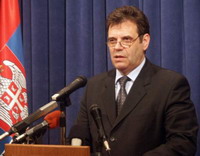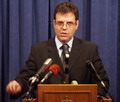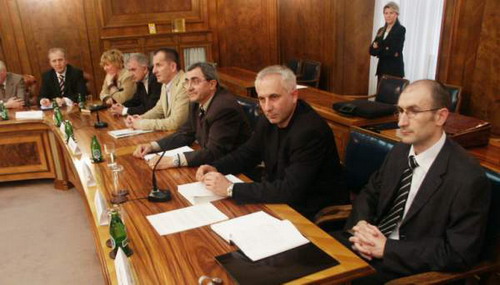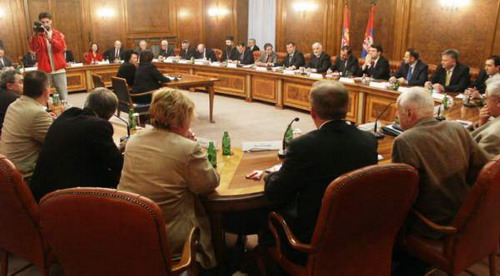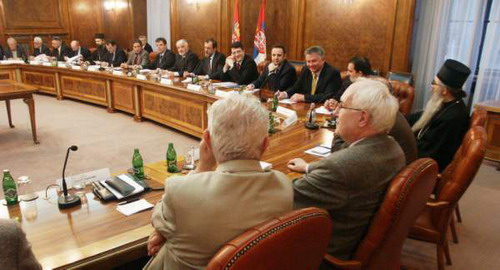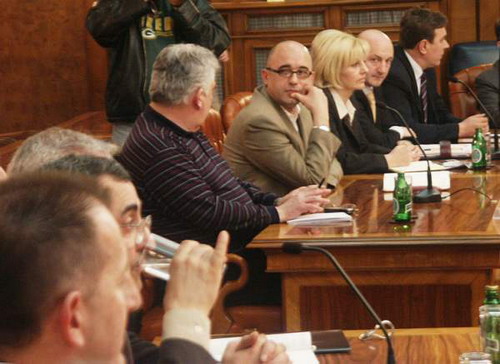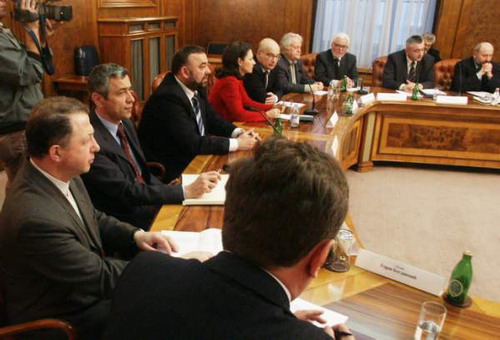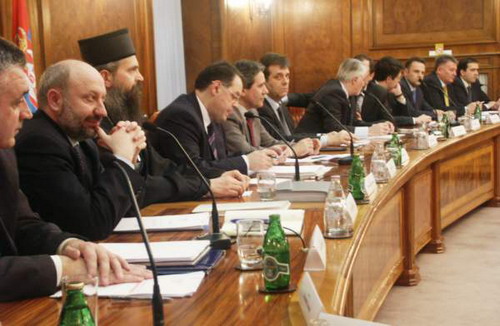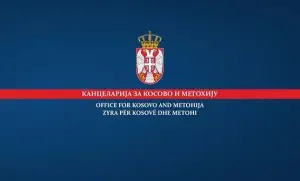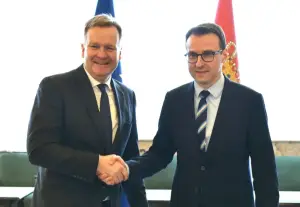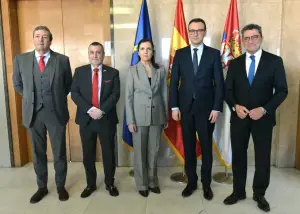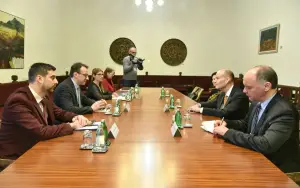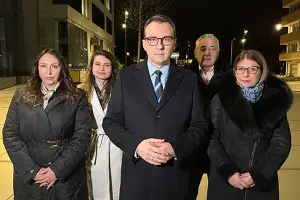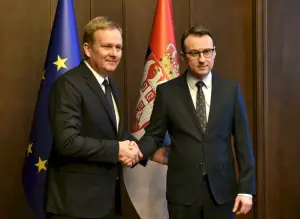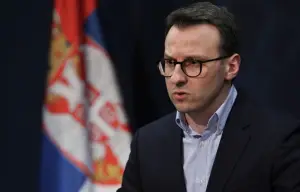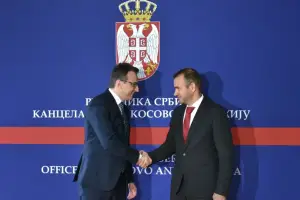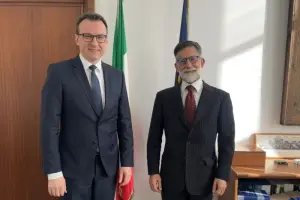Q:
A:
“We cannot and must not forget what was done on March 17 last year”
Belgrade,
17 March 2005
Serbian Prime Minister Vojislav Kostunica stated today that March 17, 2004 is a date which cannot and should not be forgotten, and even though there are many who did everything to diminish the extent of the violence, it was an attempt to start a pogrom of Serbs and non-Albanians.
At a press conference after a session of the Council for Kosovo-Metohija, Kostunica underlined that the violence committed on March 17 must not be forgotten because of our moral obligation and because the issue of standards and rights in Kosovo-Metohija will be discussed frequently and in depth this year.
“There was violence against the Serb and non-Albanian population before March 17, 2004, as well as afterwards”, Kostunica said and assessed that the events before the date of the pogrom in Kosovo-Metohija were attempted ethnic cleansing of the non-Albanian population, above all Serbs.
As he explained, this attempt at ethnic cleansing was not naïve at all, nor was it spontaneous, as some tried to present it at first through media manipulation. About 60,000 Albanians took part in the pogrom, Kostunica said and added that such a large number of people could not have gathered had this not been an organised attempt, during which 4,000 Serbs were exiled from their homes, of which only a small number have returned.
The presented data point to another fact, that the damage done in this pogrom has not been repaired, that is, Serb houses have either not been repaired or done so only in small numbers, stated Kostunica and underscored that besides petty perpetrators whose sentences have not been fully determined, the organisers of the March 17 pogrom have never been brought to justice.
He said that special attention must be paid to the organisers of the pogrom because the level of implementation of human rights in Kosovo-Metohija will be assessed this year.
“There is talk of a multiethnic society in Kosovo-Metohija, but the last hope of creating such a society died on March 17 2004”, stated the Serbian Prime Minister.
According to him, the idea of a multiethnic society in Kosovo-Metohija has been sabotaged in other ways, through various documents mentioning the “citizens of Kosovo-Metohija”, and not the national communities living there. In such a case, there would be an obligation to protect minority national communities, those being the Serbs and other non-Albanians.
“The minority in Kosovo-Metohija was not protected prior to March 17, nor is it protected now. There is no adequate protection of minorities by interim institutions of Kosovo self-government, nor for example, in the Kosovo Assembly, as a minority can still be outvoted”, Kostunica explained.
He said that there are currently no protective mechanisms that could be used by minorities in the province to secure their vital interests.
Kostunica explained that attempts to protect minorities, especially after March 17, had faced obstruction, even extending towards the Serbian’s government’s attempt to put forth a proposal for decentralisation and self-rule for Serbs in Kosovo-Metohija.
This decentralisation proposal would not ethnically divide Kosovo-Metohija, rather it would offer the needed protection mechanisms of the minority Serb population, stated Kostunica and underlined that these rights would give Serbs in Kosovo-Metohija a somewhat safe and secure life.
Since March 17 of last year, Kostunica pointed out that the Serbian government prepared its institutions to engage in any sort of dialogue to repair the problems, but that Belgrade has consistently been shut out of all decentralisation talks, above all through the efforts of the current special representation of the UN Secretary General for Kosovo, Soren Jessen-Petersen
Kostunica announced at today’s session of the Kosovo-Metohija Council that an agreement had been reached to make the first issue at the next session the question of the return of Serbs to Kosovo-Metohija.
During 2002, the formula “standards prior to status” was created, which meant that a certain level of standards of human rights in Kosovo-Metohija must be achieved, in order to commence talks on the future status of the province. Kostunica explained that, as the international community began to come to the realisation that the plan was not working, notably due to March 17, talk of “standards and status” negotiations surfaced, resulting in talk about first resolving the issue of the status, as this guarantees some kind of stability, while standards would always remain unstable.
“I believe that there is a deception in the initial formula ‘standards prior to status’. The real formula should be ‘return, followed by standards and then status’”, stated the Prime Minister and underlined that the question of return was fundamental, because at issue is the right of people to live in their homes in the face of the fact that a large number of people have been expelled from their homes.
Kostunica recounted today’s statement by Ombudsman for Kosovo-Metohija Marek Nowitzki who said that “it is very difficult to return to Kosovo under trauma after what happened in March last year”, and quoted him as saying “that he personally would not return under such circumstances, even if his home were renovated and ready, as this would still be too much”.
The Prime Minister assessed that these words speak best about where the standards in Kosovo-Metohija are one year later.
Kostunica repeated that the Serbian government would continue its dialogue and its pledge to fight for the right of people to live safely in their homes, as well as for the right of Serbs to move freely in Kosovo-Metohija. “We will fight for everything which at this moment is not part of the reality in Kosovo-Metohija, and we will do everything for this reality to be in accordance with European standards”, Kostunica said.
After his press conference, the Serbian Prime Minister attended the official academy dedicated to last year’s pogrom in Kosovo-Metohija held at the Belgrade National Theatre.
“There was violence against the Serb and non-Albanian population before March 17, 2004, as well as afterwards”, Kostunica said and assessed that the events before the date of the pogrom in Kosovo-Metohija were attempted ethnic cleansing of the non-Albanian population, above all Serbs.
As he explained, this attempt at ethnic cleansing was not naïve at all, nor was it spontaneous, as some tried to present it at first through media manipulation. About 60,000 Albanians took part in the pogrom, Kostunica said and added that such a large number of people could not have gathered had this not been an organised attempt, during which 4,000 Serbs were exiled from their homes, of which only a small number have returned.
The presented data point to another fact, that the damage done in this pogrom has not been repaired, that is, Serb houses have either not been repaired or done so only in small numbers, stated Kostunica and underscored that besides petty perpetrators whose sentences have not been fully determined, the organisers of the March 17 pogrom have never been brought to justice.
He said that special attention must be paid to the organisers of the pogrom because the level of implementation of human rights in Kosovo-Metohija will be assessed this year.
“There is talk of a multiethnic society in Kosovo-Metohija, but the last hope of creating such a society died on March 17 2004”, stated the Serbian Prime Minister.
According to him, the idea of a multiethnic society in Kosovo-Metohija has been sabotaged in other ways, through various documents mentioning the “citizens of Kosovo-Metohija”, and not the national communities living there. In such a case, there would be an obligation to protect minority national communities, those being the Serbs and other non-Albanians.
“The minority in Kosovo-Metohija was not protected prior to March 17, nor is it protected now. There is no adequate protection of minorities by interim institutions of Kosovo self-government, nor for example, in the Kosovo Assembly, as a minority can still be outvoted”, Kostunica explained.
He said that there are currently no protective mechanisms that could be used by minorities in the province to secure their vital interests.
Kostunica explained that attempts to protect minorities, especially after March 17, had faced obstruction, even extending towards the Serbian’s government’s attempt to put forth a proposal for decentralisation and self-rule for Serbs in Kosovo-Metohija.
This decentralisation proposal would not ethnically divide Kosovo-Metohija, rather it would offer the needed protection mechanisms of the minority Serb population, stated Kostunica and underlined that these rights would give Serbs in Kosovo-Metohija a somewhat safe and secure life.
Since March 17 of last year, Kostunica pointed out that the Serbian government prepared its institutions to engage in any sort of dialogue to repair the problems, but that Belgrade has consistently been shut out of all decentralisation talks, above all through the efforts of the current special representation of the UN Secretary General for Kosovo, Soren Jessen-Petersen
Kostunica announced at today’s session of the Kosovo-Metohija Council that an agreement had been reached to make the first issue at the next session the question of the return of Serbs to Kosovo-Metohija.
During 2002, the formula “standards prior to status” was created, which meant that a certain level of standards of human rights in Kosovo-Metohija must be achieved, in order to commence talks on the future status of the province. Kostunica explained that, as the international community began to come to the realisation that the plan was not working, notably due to March 17, talk of “standards and status” negotiations surfaced, resulting in talk about first resolving the issue of the status, as this guarantees some kind of stability, while standards would always remain unstable.
“I believe that there is a deception in the initial formula ‘standards prior to status’. The real formula should be ‘return, followed by standards and then status’”, stated the Prime Minister and underlined that the question of return was fundamental, because at issue is the right of people to live in their homes in the face of the fact that a large number of people have been expelled from their homes.
Kostunica recounted today’s statement by Ombudsman for Kosovo-Metohija Marek Nowitzki who said that “it is very difficult to return to Kosovo under trauma after what happened in March last year”, and quoted him as saying “that he personally would not return under such circumstances, even if his home were renovated and ready, as this would still be too much”.
The Prime Minister assessed that these words speak best about where the standards in Kosovo-Metohija are one year later.
Kostunica repeated that the Serbian government would continue its dialogue and its pledge to fight for the right of people to live safely in their homes, as well as for the right of Serbs to move freely in Kosovo-Metohija. “We will fight for everything which at this moment is not part of the reality in Kosovo-Metohija, and we will do everything for this reality to be in accordance with European standards”, Kostunica said.
After his press conference, the Serbian Prime Minister attended the official academy dedicated to last year’s pogrom in Kosovo-Metohija held at the Belgrade National Theatre.

